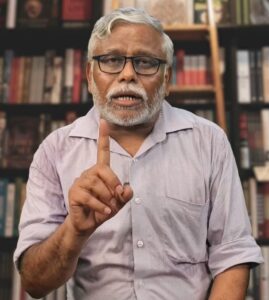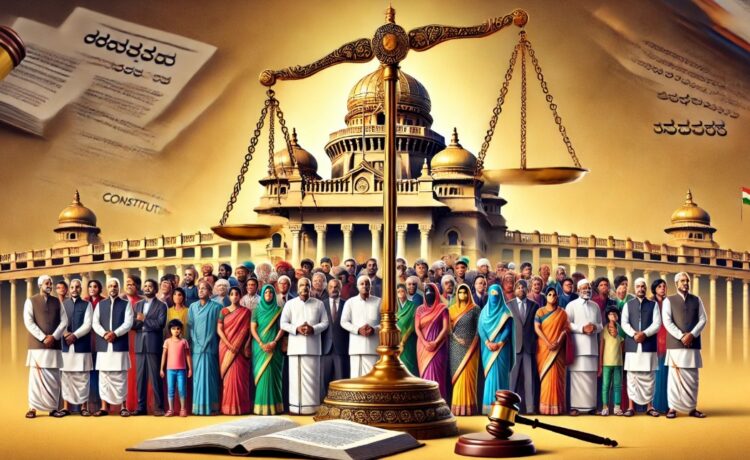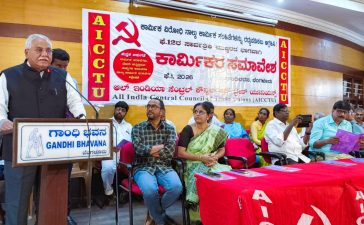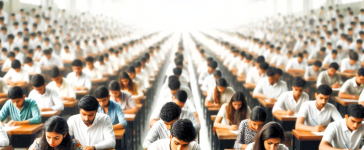Karnataka’s Reservation Debate: Constitutional Obligation or Political Agenda?
The Karnataka government, led by Chief Minister Siddaramaiah, has announced a 4% reservation for Muslims under Category 2-B in government contracts. This move, along with the existing reservations for backward classes under Categories 1 and 2-A, has sparked strong opposition from the Bharatiya Janata Party (BJP), which labels it as unconstitutional and an act of appeasement.
BJP leaders argue that reservation based on religion is unconstitutional and contradicts India’s legal framework. However, before examining the legitimacy of Muslim reservation, it is crucial to evaluate the BJP’s stance on constitutional principles and reservations.
The EWS Reservation and Constitutional Interpretations
The BJP-led government introduced the Economically Weaker Section (EWS) quota for upper-caste middle-class individuals, justifying it under Article 46 of the Indian Constitution. However, Article 46 explicitly states that special provisions should be made for socially and educationally backward classes, not solely for economically weaker individuals. This raises questions about the BJP’s commitment to constitutional integrity.
Constitutional Provisions Supporting Muslim Reservation
 The reservation for Muslims is not based on religion but on their classification as a socially and educationally backward community. Articles 15(4) and 16(4) of the Indian Constitution empower the government to identify and uplift backward sections of society, regardless of their religious identity.
The reservation for Muslims is not based on religion but on their classification as a socially and educationally backward community. Articles 15(4) and 16(4) of the Indian Constitution empower the government to identify and uplift backward sections of society, regardless of their religious identity.
The constitutional mandate requires governments to periodically identify communities facing socio-economic disadvantages and provide necessary affirmative actions, including reservations. The provision does not discriminate based on religion; rather, it ensures support for any group found to be socially and educationally backward.
Judicial Precedents Affirming Muslim Reservation
Karnataka High Court’s Stand
In 1979, the Karnataka High Court, in WP 4371/77, ruled that Muslims should not be excluded from the list of backward classes merely because they belong to a religious minority. The court observed:
“So far as the Muslims are concerned, the commission was unwise in excluding them from the list of Backward Classes solely on the ground that they belong to a religious minority. The Commission has, however, found that the Muslims are socially and educationally backward and also do not have adequate representation in the service. The fact that they are a religious minority is no ground to exclude them from the list of backward classes. The government, in our opinion, was perfectly justified in listing the Muslims in the list of Backward Classes.”
The Mandal Commission Judgment
The Supreme Court’s 1992 ruling in the Indra Sawhney case (Mandal Commission) reaffirmed the validity of reservations for socially and educationally backward groups, including Muslims. The ruling stated:
“This inadequate representation is not confined to any specific section of the people but applies to all those who fall under the category of social backwardness, whether they are Shudras of the Hindu community or similarly situated other backward classes in other communities, namely, Muslims, Sikhs, Christians, etc.”
This judgment further solidified the legal basis for Muslim reservation, reinforcing that backwardness, not religion, should be the determining factor.
Karnataka’s Historical Commissions and Studies
Multiple expert commissions in Karnataka have validated the need for reservations for Muslims based on scientific socio-economic studies:
- 1918 Miller Committee
- 1960 Nagangouda Committee
- 1977 Devaraj Urs Government Report
- 1986 Venkataswamy Commission
- 1990 Chinnappa Reddy Commission
These studies consistently concluded that Muslims, as a whole, are socially and educationally backward. The Chinnappa Reddy Commission, in its exhaustive report, categorically stated:
“The picture presented by the Muslim community as a whole is that of a socially and educationally backward class.”
The Hypocrisy of BJP’s Opposition
Despite overwhelming evidence supporting the backward status of Muslims, BJP leaders continue to oppose their reservation, branding it unconstitutional. However, the same party has extended reservations to other religious minorities, such as Christians and Jains, under various categories.
In contrast, the recent reservation model proposed by the Bommai government includes Christians and Digambar Jains under Category 2-D and Buddhists under Category 2-A. If BJP’s opposition to Muslim reservation were based on constitutional concerns, then why have these other religious groups been accommodated under similar provisions?
Conclusion: Constitutional Mandate vs. Political Narrative
The debate on Muslim reservation in Karnataka is not merely a legal discussion but a reflection of larger political ideologies. Judicial rulings, historical commissions, and constitutional provisions unequivocally support affirmative action for socially and educationally backward communities, including Muslims.
Denying them reservation solely on religious grounds is not only unconstitutional but also a politically motivated act that undermines the fundamental principles of justice and equality. The BJP’s selective approach to reservations exposes its double standards, making its opposition less about legality and more about political maneuvering.
As the discourse continues, the question remains: Will governance be guided by constitutional values or by political expediency.
Statements & Quotes:
✅ Legal Expert: “Reservation is about social and educational backwardness, not religion. The Constitution permits affirmative action for any group facing systemic disadvantage.”
✅ Political Analyst: “The BJP’s stance on Muslim reservation contradicts its own policies on EWS quotas and reservations for other minorities like Jains and Christians.”
✅ Judicial Ruling (Indra Sawhney Case, 1992): “Social and educational backwardness is not restricted to any religion. If a community meets the criteria, it qualifies for reservation.”
✅ Karnataka High Court (1979): “Excluding Muslims from the OBC list simply because they are a religious minority is unjust.”
✅ Senior Journalist: “The debate isn’t about law but about politics. The Constitution allows Muslim reservation, but opposition to it is driven by ideological narratives.”
Q&A Section:
❓ Q: Is the 4% Muslim reservation in Karnataka based on religion?
🔹 A: No, it is based on social and educational backwardness, as affirmed by multiple commissions and court rulings.
❓ Q: Has the Supreme Court allowed reservation for Muslims?
🔹 A: Yes, in the Indra Sawhney case (1992), the Supreme Court upheld reservations for backward classes in all communities, including Muslims.
❓ Q: What about BJP’s EWS quota for upper castes?
🔹 A: The EWS quota is based on economic status alone, whereas Article 46 of the Constitution specifies reservations should be for socially and educationally backward classes.
❓ Q: Are other religious minorities given reservations?
🔹 A: Yes, Christians, Jains, and Buddhists have been granted reservations under various categories, making BJP’s stance against Muslim reservations inconsistent.
Context & Background:
- The Karnataka government announced a 4% reservation for Muslims under Category 2-B.
- BJP claims this is unconstitutional and an act of appeasement.
- Multiple judicial rulings (including the Indra Sawhney case) and commissions (such as the Chinnappa Reddy Commission) have confirmed the backward status of Muslims.
- BJP’s opposition is being questioned, given their introduction of the EWS quota, which some argue is constitutionally inconsistent.
Short Summary:
The Karnataka government’s decision to provide a 4% reservation for Muslims under Category 2-B has sparked political controversy. While the BJP opposes the move, citing religious-based reservation as unconstitutional, legal precedents and expert reports confirm that Muslims qualify as a socially and educationally backward group. Courts and commissions have consistently upheld their inclusion in OBC quotas, making the BJP’s opposition appear more political than constitutional.
#Karnataka #ReservationDebate #MuslimReservation #AffirmativeAction #OBC #SocialJustice #ConstitutionalRights #LegalFacts #BJP #PoliticsVsConstitution
![]()











